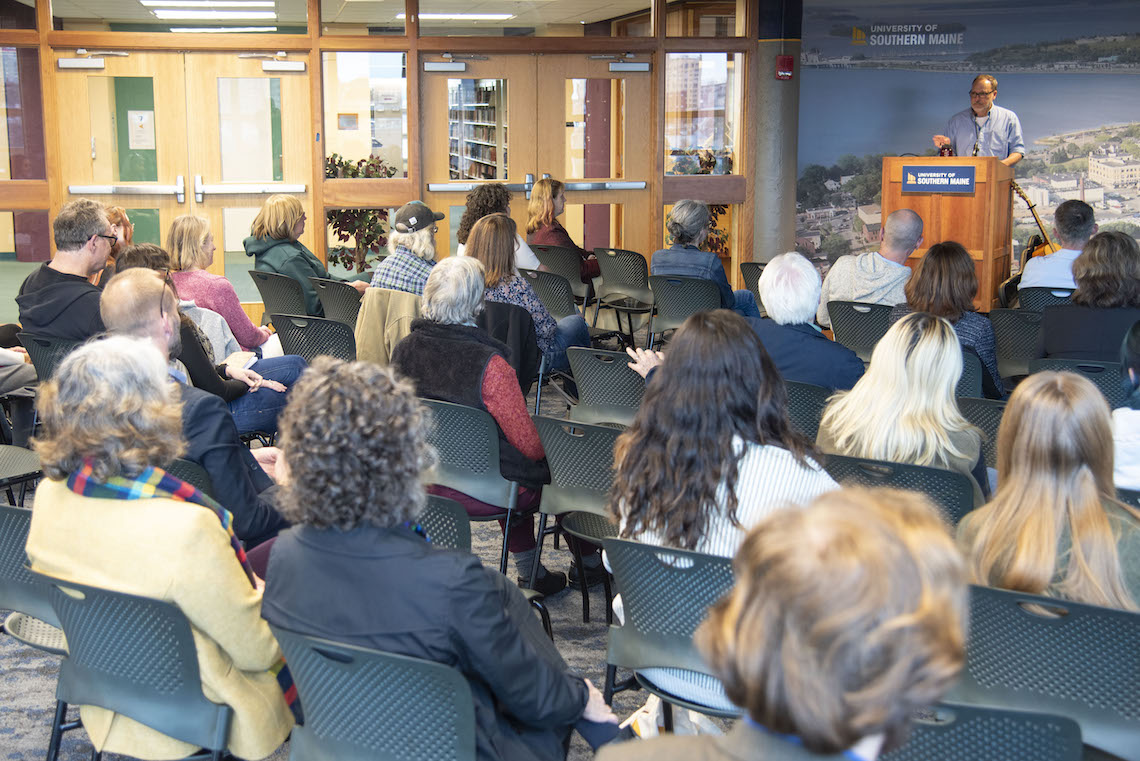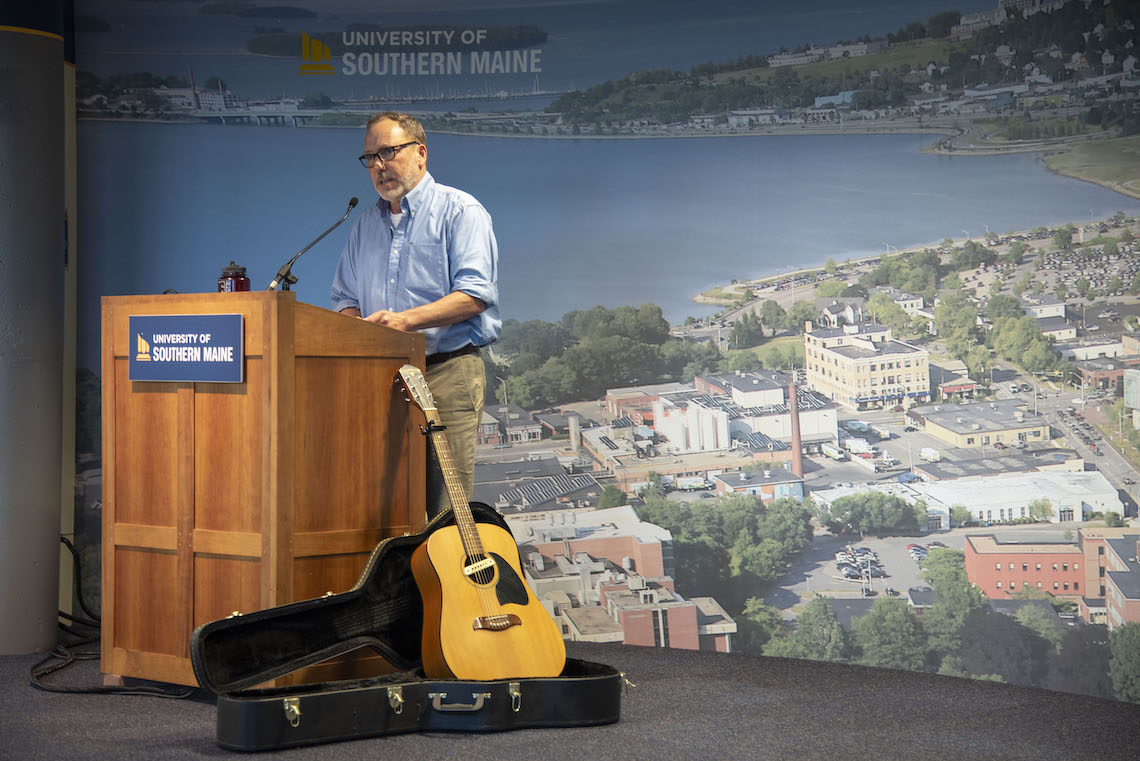
Maurice Manning came to Portland to unpack his writing process but not, as it turned out, his luggage.
Manning was the featured presenter of the 2023 O’Brien Poetry Event on October 18. His flight ran late, leaving no spare time for a pit stop at his hotel. Instead, he drove straight from the airport to a roundtable discussion at the University of Southern Maine’s Glickman Library, where he promptly plunked down his suitcase and greeted his audience.

For the next half hour, Manning answered every question that was put to him about his inspirations, influences, and technique. He spoke in the measured drawl of his native Kentucky. The accent has a musical quality that he tries to capture in print by writing his poems in iambic tetrameter.
“There’s just something about that four-beat line. You can make it kind of sing or you can make it talk,” Manning said. “My attraction to that is, that’s sort of what I heard as a youngster.”
To illustrate his point, Manning recounted an otherwise mundane conversation he overheard at a gas station. His ears perked up at the phrase, “The little feller’s doin’ good.” The repeated consonant sounds formed a beat that stuck in his mind. The authenticity of the setting and interaction further increased its appeal as an example of the poetry in everyday life.
Manning made the musicality of his writing even more explicit during the reading that followed the roundtable. He began by reciting several passages from his newest poetry collection, titled “Snakedoctor.”
Sugar
of life, especially the things
that might be done in the name of love,
the unforgivable acts of love.”
Between certain selections of poems and tall tales, Manning would whip out a guitar and play a folk tune that evoked the same cultural currents. His melodic style of poetry connected with Meghan Mallory.

“I was really fascinated by his approach to meter and music because I’m a musician myself,” Mallory said. “My mom’s a music teacher, so I’ve always thought that music and language are very interconnected.”
Mallory is a sophomore majoring in Linguistics. Her enthusiasm earned her the privilege of introducing Manning at the start of his poetry reading. Summarizing such a long list of credentials is no small task.
Manning teaches at Transylvania University in Kentucky and Warren Wilson College in North Carolina. Along with multiple poetry collections, his writing has also appeared in “TIME” and “The New Yorker.” He was a Pulitzer Prize finalist in 2011 for his collection, “The Common Man.” However, Manning doesn’t put much stock in awards.
“I’ve learned that you don’t do this for recognition or accolades or whatever,” Manning said. “And it’s not a competition. I believe that there’s this thing we call ‘poetry.’ And it’s not owned by anybody. We share it.”
Shared history is also a major touchstone for Manning. Much of his poetry explores American frontier life and the emergence of a common national identity. He wrote an entire collection, “Railsplitter,” in the voice of Abraham Lincoln. Manning’s home in Kentucky is only a short distance from Lincoln’s birthplace. He made the trip repeatedly to draw inspiration from the landscape.

Manning’s ancestors were witnesses to that sweep of history. The same farm has been in his family since the 1700s. He knows the hills and hollows and the people who populate them. For all his specificity of experience, his poetry has no problem finding a broad audience.
“For me, Kentucky is the starting point and it spins outward from that,” Manning said. “I feel like the Kentucky lens that I look through, I can also see beyond Kentucky.”
Manning counts among his influences both classic and contemporary poets. He particularly admires the way Shakespeare maintains the rhythm of his verse in conversation between two characters.
Manning reserved special praise for Edwin Arlington Robinson, who grew up in the Maine town of Gardiner. Though little known today, Robinson won three Pulitzers spanning the 1920s. Manning hailed him as a master of structure and sensitivity. Robinson’s poem “Mr. Flood’s Party” is a mainstay of Manning’s classroom instruction.
Mr. Flood’s Party
And there was nothing in the town below–
Where strangers would have shut the many doors
That many friends had opened long ago.”
Because he’s friends with so many living poets, Manning hesitated to single them out, but finally named A.E. Stallings from Georgia and Vermont’s Kerrin McCadden. His recommendations found a receptive audience with members of the USM Poets Society. The group is news and looking to grow. Its first event is a poetry slam slated for Halloween.

Manning’s student outreach continued beyond his reading. The next day, he visited a class taught by Dr. Shelton Waldrep, chair of the English Department.
“Students often ask about the craft of poetry, the poet’s work methods, and how a particular poem might have been written,” Waldrep said. “Meeting with the O’Brien poet allows students access to world-class talent and to poets actively involved with producing work of an award-winning calibre.”
Waldrep is one of the key planners of the O’Brien Poetry Event. It began with a donation from Katharine O’Brien, a former teacher at Deering High School in Portland. In accordance with her wishes, USM brings a different poet to campus each year. Manning is the 22nd poet to be so honored.
The new poems that Manning read as part of his presentation will soon be available in book form. “Snakedoctor” is set for release next month. If you’d rather let him do the reading for you, Manning also hosts a podcast called “The Grinnin’ Possum.”

